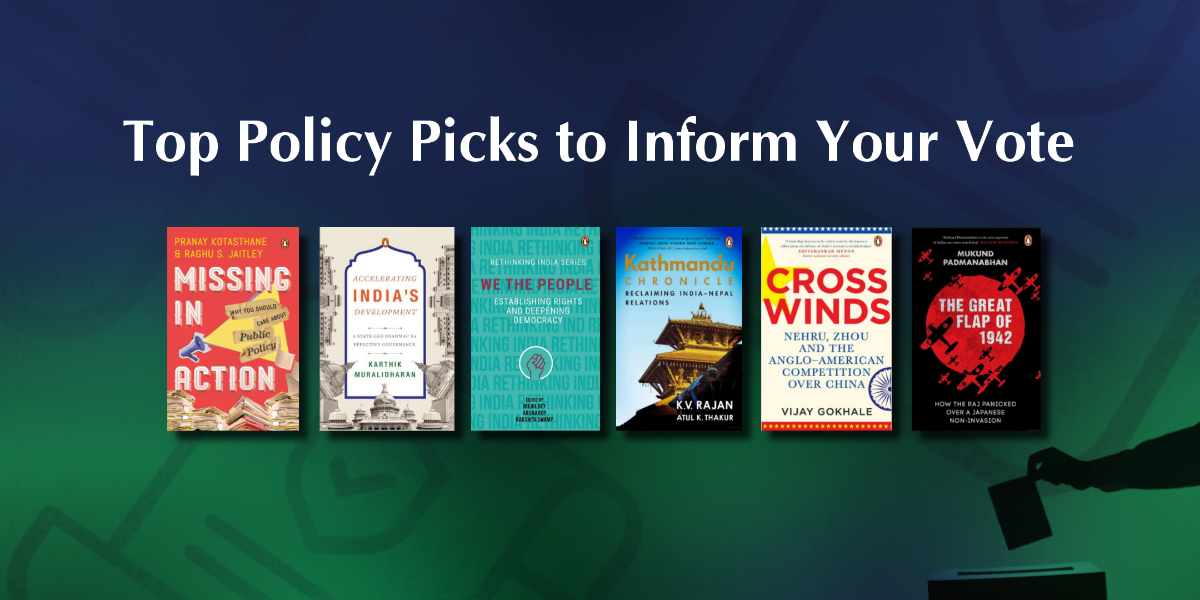
Ever wondered how India makes its big decisions and deals with other countries? This handpicked selection of books, that are both insightful and informative, will break down everything from how the government works at home to how it handles stuff abroad. Get ready to dive into the world of Indian policies and international relations with these 9 must-read books!
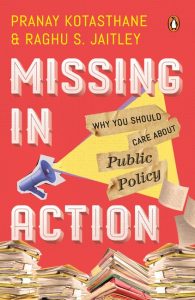
Missing in Action
Pranay Kotasthane, Raghu S Jaitley
Missing in Action aims to change such perceptions through sketches from everyday experiences to illustrate India’s tryst with public policymaking. It acquaints the reader with some fundamental concepts of the public policy discipline. It explains the logic (or the lack of it!) of the Indian State’s actions, shortcomings, constraints, and workings.
Jargon-free and accessibly written, the book achieves the difficult task of both entertaining and educating.
There have been many books about Indian society, but none so far about the Indian state. Missing in Action fills that gap, and how! Kotasthane and Jaitley are two of our finest thinkers, and their writing combines a surgeon’s precision with a poet’s art of revealing the unseen. They paint both the big picture and the small details. This book is a masterpiece that will be essential reading 50 years from now. If you want to understand India, you should read Missing in Action.
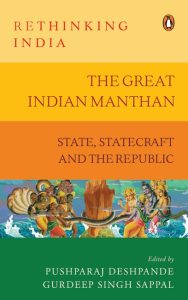
The Great Indian Manthan
Pushparaj Deshpande, Gurdeep Singh Sappal
The Great Indian Manthan: State, Statecraft and the Republic features sharply insightful and meaningful essays from India’s foremost politicians and practitioners. Collectively, they dissect the why, what and how of the Indian State.
Each essay in the tenth volume of the Rethinking India series outlines the norms that underpin the governing instruments of the Indian State and critically analyse how they function. In a measured and methodical manner, they then demonstrate how the State has deviated from its constitutional raj dharma (moral duties) and the adverse impacts this has had on every aspect of India’s society, economy and polity. The essays thus juxtapose what should have been, what is and what should be. From their singularly unique vantage point, the authors also propose innovative and disruptive solutions to redress structural fault lines that hold India back.
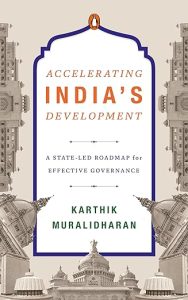
Accelerating India’s Development
Karthik Muralidharan
Accelerating India’s Development is addressed to all Indians—leaders, officials, entrepreneurs, teachers, students, citizens, and civil society—and provides an urgent call to action. It argues that building a more effective state is the great unfinished task of Indian democracy, because quality public services are key to translating the political equality of ‘one person, one vote’ into greater equality of opportunity for all Indians.
Every chapter showcases the author’s dedication to bridging the gap between scholarly research, public understanding, and actionable governance. This book is a testament to cautious optimism and the belief that with the right public systems in place, the next twenty-five years can be a period of unprecedented growth and societal enrichment for India.
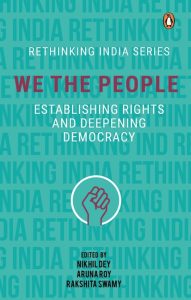
We The People
Nikhil Dey, Aruna Roy, Rakshita Swamy
Who are the people of India? What are their rights? What are their claims on the Indian Constitution and on democracy? We the People, the fourth volume in the Rethinking India series, brings together a collection of essays that explores the process of germination and growth of undisputed universal rights, and of them being developed as tangible entitlements in India. The essays also examine the continuing challenge of establishing, realizing and protecting these entitlements.
The authors are academics, activists and practitioners who have a strong relationship with social movements. Their narratives trace the use of the rights-based framework of the Indian Constitution by sociopolitical movements in order to strengthen the economic, cultural and social rights of ordinary Indians. The multiple perspectives draw upon and contextualize the complex relationship of the citizen with the state, society and market in democratic India. Their sharp critiques have a counterpoint in stories of creative, successful alternatives designed by peoples’ collectives.
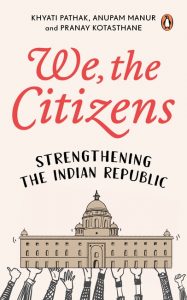
We, The Citizens
Khyati Pathak, Anupam Manur, Pranay Kotasthane
We, The Citizens, by Khyati Pathak, Anupam Manur and Pranay Kotasthane, decodes public policy in the Indian context in a graphical narrative format relatable to readers of all ages. If you want to be an engaged citizen, aspire to be a positive change-maker, or wish to understand our sociopolitical environment, this book is for you.
The idea of India was an audacious dream. The fulfilment of this dream lies upon We, the citizens.
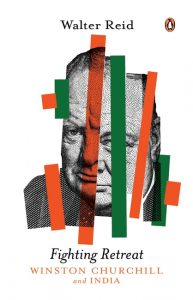
Fighting Retreat
Walter Reid
Winston Churchill was closely connected with India from 1896, when he landed in Bombay with his regiment, until 1947, when Independence was finally achieved. No other British statesman had such a long association with the subcontinent—or interfered in its politics so consistently and harmfully.
Churchill strove to sabotage any moves towards Independence, crippling the Government of India Act over five years of dogged opposition to its passage in the 1930s. As prime minister during the Second World War, Churchill frustrated the freedom struggle from behind the scenes, delaying Independence by a decade. To this day for Indians, he is the imperialist villain, held personally responsible for the Bengal Famine of 1943.
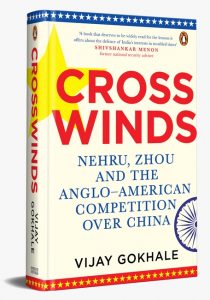
Crosswinds
Vijay Gokhale
Crosswinds is based on archival material, outlines India’s efforts to craft a foreign policy in the context of the Anglo–American competition in the Far East. The roles played by the towering personalities of that era—Jawaharlal Nehru, Zhou Enlai, Harry S. Truman, Dwight D. Eisenhower, John Foster Dulles, Winston Churchill, Anthony Eden and Krishna Menon—and the personal chemistry between them are woven into the narrative to paint a picture of the nuts and bolts of Indian diplomacy during the early years of the nation.
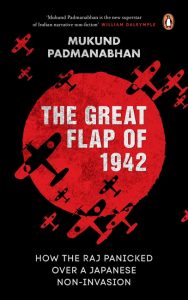
The Great Flap of 1942
Mukund Padmanabhan
The Great Flap of 1942 is a narrative history of a neglected and scarcely known period—between December 1941 and mid-1942—when all of India was caught in a state of panic. This was largely a result of the British administration’s mistaken belief that Japan was on the verge of launching a full-fledged invasion. It was a time when the Raj became unduly alarmed, when the tongue of rumour wagged wildly about Japanese prowess and British weakness and when there was a huge and largely unmapped exodus (of Indians and Europeans) from both sides of the coastline to ‘safer’ inland regions. This book demonstrates, quite astonishingly, that the Raj cynically encouraged the exodus and contributed to the repeated cycles of rumour, panic and flight. It also reveals how the shadow of the Japanese threat influenced the course of nationalist politics, altered British attitudes towards India and charted the course towards Independence.
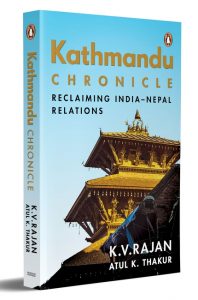
Kathmandu Chronicle
K.V. Rajan, Atul K. Thakur
What are the real causes of regular anti-Indian eruptions in Nepal, and why is there so much mutual distrust and suspicion despite India’s best intentions? Anecdotal, definitive and deeply researched, Kathmandu Chronicle opens a window to many stories of India–Nepal relations that largely remain untold and therefore unknown till date.









